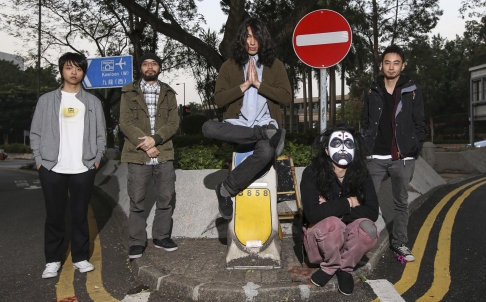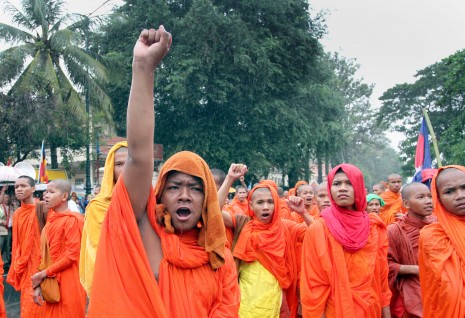
Bang That Tibetan Bowl
The year is admittedly young, but I’m already giddy about what will undoubtedly survive as one of the best headlines of 2014. This doozy comes from the Hong Kong–based South China Morning Post (SCMP), which splayed the following across its paper a couple days ago: “Local Buddhist Metal Band Chock Ma Find a Groove in Spiritual Awareness.” The only danger is that the chuckle-inducing headline will discourage readers from further investigation. Beneath this comic novelty is an authentically awesome group of young Buddhist artist-activists.
Chock Ma started playing in 2003, and has evolved into what the SCMP calls “a blend of progressive metal and post-rock, with a touch of traditional Chinese music.” Occasionally their songs even feature an indigenous Australian instrument known as the didgeridoo and Tibetan singing bowls. In March, they plan to release their debut album, the title of which translates from Chinese into “Expose the Nature from Inside.” The alternative title for English audiences, Dharma Bums, evokes the band’s religious beliefs and western influences.
Chock Ma is known for provocative lyrics that combine Buddhist themes with environmental and political messages. One of their songs, entitled “Born Together-Reared Apart,” explores the shifting sociopolitical identities between Hong Kong, Taiwan, and mainland China. Another song, “No Escape,” gravely describes post-apocalyptic environmental wreckage in language reminiscent of Bob Dylan’s “Hard Rain’s A-Gonna Fall.” Taking their commitment to environmental action one step further, the band has vowed to provide bags of seeds for the first 100 people who pre-order their new album. Though its lyrics are in Chinese, their recent song “Bird Speech” (music video below) features an inspiringly strange mix of urban metal, spiritual aspirations, and environmental awareness.
Bogus Buddhists Seek “Alms”
In Sydney, Melbourne, and other cities across Australia, conmen have posed as Buddhist monks in order to yield donations from unsuspecting passersby. The Sydney Morning Herald (SMH) reports that the local intrepid outfit may include up to six collaborators, who don traditional brown robes and shaved heads, yet—according to one victim—seem to have overlooked proper foot exposure: “The police asked: ‘Have you ever seen a monk asking for a donation before? I said ‘No I guess not.’ They asked if I’ve ever seen a monk in Nike shoes? I haven’t.” What good is theft if you have to spend most of your loot on foot bandages?
Jokes aside, the scam has sparked a debate over what makes a monk a monk and what a makes a fraud a fraud—especially after police initially insinuated that participants had not committed any crime. Apparently the thieves have tiptoed around the law, in part by avoiding any verbal self-identification as monks. Yet Greg Heathcote, a criminal lawyer in Sydney, will not tolerate this coy defense. He told the SMH that the thieves are “claiming to be monks by wearing the garb.”
Surely these scammers are capitalizing on our collective sympathy toward spiritual ascetics, and they’re relying on a particular cultural and religious tradition to do so—namely, Buddhism. But who are we to say whether or not these alleged thieves are monks? Perhaps we demand they meditate five hours per day, or chant specific sutras, or—at the very least—abstain from drinking. Yet the thought of imposing religious standards upon them would likely sound antiquated and arbitrary to the tourists of Sydney. I’m reminded of my fellow diaspora Jews who poke fun at the inconsistent constraints of kashrut—Jewish dietary laws. But yes, yes, at the very least we expect lip service to be paid to lofty intentions like self-transcendence, world harmony, liberation from suffering. And we demand that our donations further those ends, in part so we don’t have to. Maybe what’s so appalling about postured virtue is how it reminds us collectively of our own similar, less visible scam.
Uprisings in Cambodia, Too

One month ago, I discussed the role Buddhist monks have played in the large political demonstrations that ensnared Bangkok. Today, those protests continue and have garnered predominantly negative press, as the opposition leadership refuses to participate in an upcoming election that they’re likely to lose. Meanwhile, similar nonviolent mass actions have broken out in nearby Cambodia, where 96% of the population is Buddhist. Unfortunately, the Cambodian government has been more violently repressive than its Thai counterparts: last week it killed at least three and injured twenty.
The government crackdown came in response to the tens of thousands of people who have marched on the capital of Phnom Penh demanding the removal of longtime authoritarian Prime Minister Hun Sen, who regained power in a possibly illegitimate election last June. The protestors range from underpaid garment workers to opposition party stalwarts to—you guessed it—Buddhist monks. In this case, the monks bring a very specific grievance to the uprising: they are angry about the recent theft of a prized urn, which some believe holds the ashes of the Buddha himself. They argue that the successful theft exposes the priorities of a regime that’s more interested in protecting its own interests than those of the overwhelmingly Buddhist population.
The incident has prompted a rift within Cambodia’s nationwide hierarchical Buddhist institution, fittingly referred to as the sangha. Monks aligned with the opposition party recently confronted Buddhist leadership at a meeting in Phnom Penh, demanding the resignation of Supreme Patriarch Tep Vong, who is widely considered an extension of Hun Sen’s power. That is, unless he can track down the lost relic.
—Max Zahn, Editorial Intern